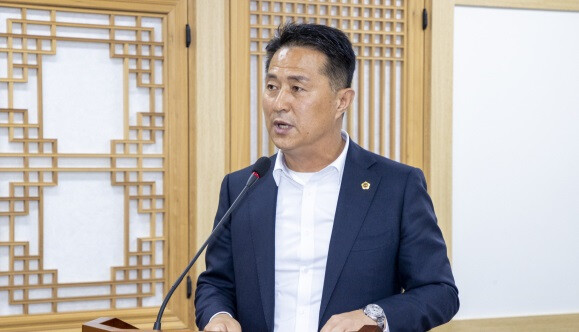
The Gyeongsangbuk-do Provincial Council is set to establish an institutional framework for systematically supporting bilingual education for multicultural students in the province. The 'Gyeongsangbuk-do Office of Education Ordinance on Supporting Bilingual Education for Multicultural Family Students,' proposed by Provincial Assembly Member Kim Jin-yeop (Pohang, People Power Party) of the Gyeongsangbuk-do Provincial Council's Construction and Fire Safety Committee, passed the Education Committee's review on the 11th and awaits final approval at the plenary session on the 24th. This ordinance is expected to greatly contribute to strengthening the language capabilities of the rapidly increasing multicultural student population, fostering a healthy self-identity, promoting cultural diversity, and facilitating social integration.
The purpose of this ordinance is to expand educational opportunities and establish a support system so that multicultural family students can deeply learn Korean along with their parents' native language. This is expected to lay the foundation for developing multilingual proficiency, an essential skill for future generations living in a global era, thereby helping individuals maximize their potential and grow into competitive talents in the international community. At the same time, it is also expected to have a positive impact on understanding and respecting their parents' culture and establishing their self-identity.
In fact, according to statistics from the Gyeongsangbuk-do Office of Education, the number of multicultural family students in the province sharply increased from 4,221 in 2014 to 12,814 in 2024, an approximately threefold increase. Statistics Korea data also shows a nationwide increase, with multicultural children increasing by 30.9% and multicultural families by 28.8% between 2015 and 2022. However, despite this quantitative growth, concerns have persistently been raised in the educational field about the inadequacy of bilingual education support systems for multicultural students. There were also worries that insufficient native language education support could lead to language development delays, as well as feelings of cultural alienation and identity confusion.
Provincial Assembly Member Kim Jin-yeop had already strongly emphasized the necessity of bilingual education and the justification for policy improvement in his 5-minute free speech during the 355th extraordinary session of the plenary meeting in April. At that time, he proposed key policies including ▷expansion of bilingual education programs ▷provision of opportunities for parental native language learning ▷strengthening teacher training, emphasizing that "bilingual education is a competitive advantage in the global era and plays a key role in forming cultural empathy."
This ordinance specifically incorporates the policy directions proposed by Assembly Member Kim. Key contents include ▷establishment of an annual basic plan for bilingual education ▷operation of diverse educational programs and clubs ▷deployment of dedicated personnel for bilingual education and implementation of training to strengthen their expertise ▷establishment of a cooperation system with relevant organizations and enhanced public relations. Through these measures, the plan is to not only strengthen the capabilities of individual multicultural students but also to foster an atmosphere that respects and embraces cultural diversity across schools and local communities.
Provincial Assembly Member Kim Jin-yeop emphasized, "Gyeongbuk has already entered a multicultural society, and bilingual education is not merely for multicultural students, but a strategic solution to overcome the structural problems of population decline and rural extinction in the region." He continued, "Multicultural students proficient in bilingualism are valuable human resources in the global era, and this ordinance is expected to be an important stepping stone for them to grow into key talents who will lead the future of the region." He further stated, "We will do our best to realize inclusive educational welfare and create an educational environment where everyone grows together." If this ordinance is finally approved, it is expected to mark a new turning point in multicultural education in Gyeongsangbuk-do.
[Copyright (c) Global Economic Times. All Rights Reserved.]






























